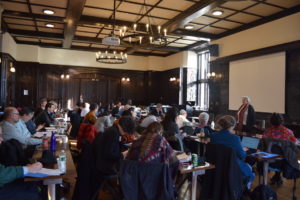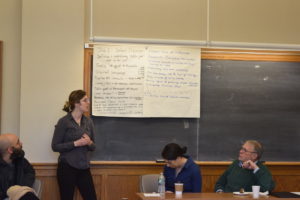The future of public goods: A Convening of Analysis, Strategy and Practice
February 27-29, 2020 – Yale University, New Haven, CT

The privatization of public goods and the transfer of risk from society to individuals has been one of the core transformations of the U.S. political economy during the last four decades. Many of today’s most urgent policy debates concern the provision of such goods—education, child care, public services, health care, recreation, employment, water, land, infrastructure, etc—and how they will be financed and controlled. At the same time, many of the most compelling collective struggles, from indigenous-led struggles over water rights to “bargaining for the common good” labor campaigns to public-financing efforts for higher education, health care, and childcare, have invoked a bold and expansive future for public goods and their provision and support.
On February 27-29, 2020, the nonprofit Alliance for a Just Society and scholars at Yale University convened a gathering of policy advocates, grassroots organizations, writers and researchers to address three central questions related to public goods and their future:
- What advocacy and organizing campaigns have demonstrated the most promise in defending or expanding the provision of public goods? Why have they worked and what lessons do they have for public goods organizing in other issue areas and sectors?
- What frameworks and narratives hold the most promise for tying together different issue-based efforts related to the provision of public goods? If “privatization” ties together a broad range of issues around market solutions and control, what are the key terms, frameworks and narratives that invoke democratic and shared control of such goods?
- How might existing research, organizing and advocacy efforts be better aligned and supported to amplify their collective impact and public resonance?

The gathering began with a public plenary framing the key issues for the discussion related to privatization, public goods, and visions for their provision. Participants then met for a series of panels, breakout groups, and strategy sessions, to share analysis and experiences and deliberate and form answers to the questions above. The broad goal of the meeting was to establish a set of connections, resources, research, strategies and analysis to support and link together a wide range of initiatives related to the provision of public goods.
Host Committee: Professor Daniel HoSang; LeeAnn Hall, Alliance for a Just Society; Libero Della Piana, Alliance for a Just Society; Isaiah Poole, Democracy Collaborative